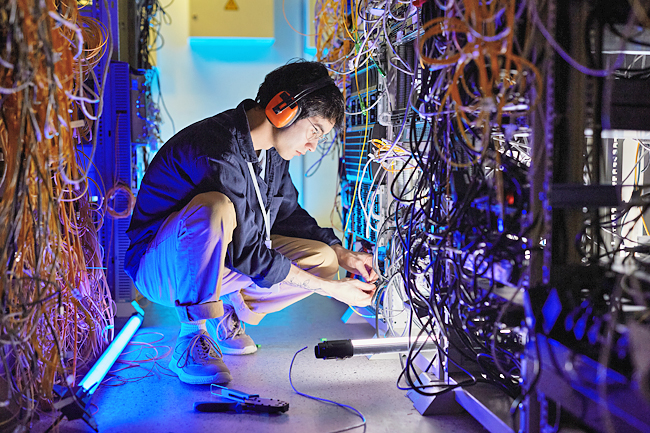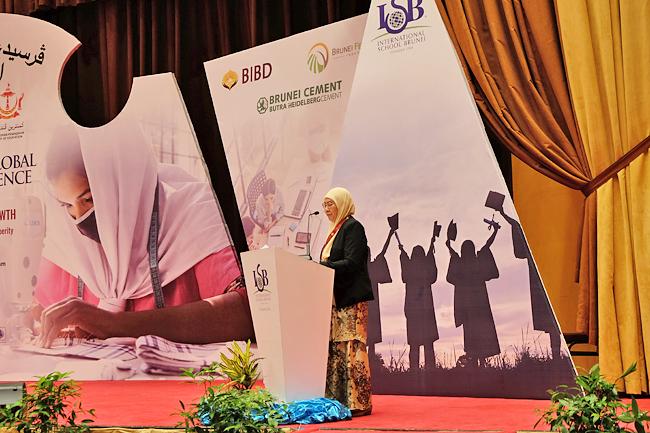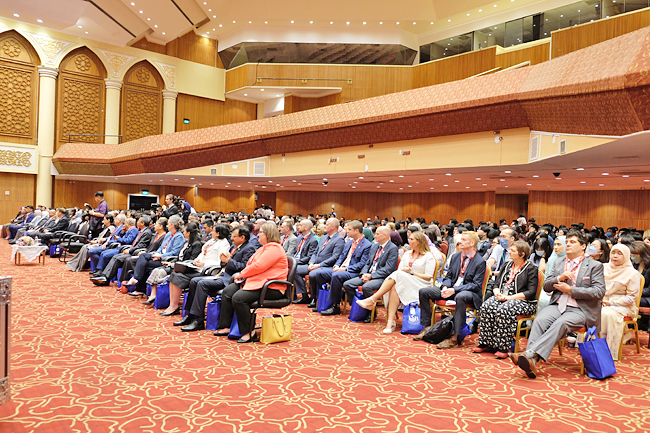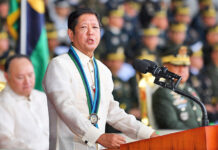Rizal Faisal
The nation’s aspirations in tackling unemployment are not just about people getting jobs, rather it is the identification and creation of jobs which serve the dynamic needs of the country and economy, as well as ensuring people are skilled and industry ready to be able to fulfil these needs and have the opportunities to build up their careers.
This can be achieved with effective manpower planning aligned with employability, focussed on gainful and sustainable employment towards tackling unemployment in Brunei Darussalam.
This was highlighted in a keynote address by Head of Manpower Planning and Employment Council (MPEC) Secretariat at the Prime Minister’s Office Dr Hajah Siti Haziah binti Pehin Orang Kaya Saiful Mulok Dato Seri Paduka Haji Abidin at the opening of the 19th International School Brunei Borneo Global Issues Conference (ISB BGIC).
The keynote reiterated the council’s vision of ‘Effective manpower planning with alignment to employability and employment’.
Dr Hajah Siti Haziah said that the first thing to do is manpower planning, which includes identifying the manpower and skill demand for Brunei for now and the future. “Secondly, we look at how we can get our locals to be able to meet that industry manpower demands.”



She elaborated that the skills gaps or competencies need to be addressed while underlining the importance of equipping locals with the competency framework and training, enabling them to be industry-ready with the right mindset.
This is where MPEC works together with industry players, training institutions and regulators.
The Manpower Industry Steering Committee (MISC) represents Energy, Construction, Transportation and Logistics, Information and Communication Technology (ICT) and Hospitality and Tourism as the main platform facilitating the tripartite collaboration linking industry players, training institutions and regulators.
Competency frameworks and various training programmes including apprenticeship programmes such as iReady have been developed catering for all individuals with varying academic qualification levels as a starting point to support their professional and skill development to make them more employable and marketable.
These were among some of the MPEC’s agenda, including supporting job seekers in obtaining employment, and also the private sector in getting local employment. The support is done through the establishment of JobCentre Brunei as a one-stop career centre with 8,500 active job seekers currently registered, at the time of writing.
Dr Hajah Siti Haziah emphasised the importance of statistics in analysing the current unemployment situation, and the nation has seen a decline in unemployment, based on the Labour Force Survey 2021 by the Department of Economic Planning and Statistics (JPES), Ministry of Finance and Economy (MoFE), from 7.3 per cent in 2020 to 4.9 per cent in 2021.
“Although this is declining, this is still a high percentage. This means that we cannot release our foot from the pedal. We must continue to address youth unemployment with vigour because we know that youth unemployment has social and economic consequences.
With this in mind, addressing youth unemployment lies at the heart and core of the objectives of many national initiatives including the action plans under National Youth Policy and Strategy (DBNS) and many MPEC programmes. In fact the Core Strategy 3 for DBNS are education, employability and decent work,” she said.
Dr Hajah Siti Haziah observed MPEC’s strategy to tackle unemployment by focussing on gainful and sustainable employment resonates very nicely with the ISB BGIC this year, fittingly themed ‘Decent Work and Economic Growth’, and also with Sustainable Development Goal (SDG) 8, which includes promoting sustainable economic growth and creating job opportunities and decent work for people all over the world.
“And this goal is crucial because when people have access to decent work and employment opportunities, they can support themselves and their families, have a better quality of life, be able to contribute to their community’s growth and development, and it promotes equal opportunities for all, regardless of gender, age or race,” she underlined.
She added that this in turn complements Brunei Vision 2035, which outlines the country’s vision and objectives for sustainable development, emphasising the need for economic diversification, human resource development, and a strong and sustainable economy.
These objectives are in line with SDG 8, which promotes sustained and inclusive economic growth, full and productive employment, and decent work for all.
According to Dr Hajah Siti Haziah, the SDGs provide a comprehensive framework for sustainable development that can help Brunei Darussalam to identify and prioritise its development goals.
The 17 SDGs cover a wide range of issues, from poverty reduction and health to education and environmental sustainability.
She said that Brunei Darussalam has a small and open economy that is heavily reliant on the oil and gas sector. SDG 8 encourages economic diversification and the development of other sectors, which can help Brunei reduce its dependence on the oil and gas industry and create new opportunities for businesses and workers.
Brunei Darussalam has committed to the SDGs as part of the United Nations’ 2030 Agenda for Sustainable Development. By doing so, the country has signalled its intention to work towards a more sustainable future and to collaborate with other countries and stakeholders to achieve common goals.
SDG 8 also emphasises the importance of promoting full and productive employment and decent work for all. As previously shared, Brunei Darussalam has a relatively high youth unemployment rate, and promoting employment opportunities, particularly for young people, can help address this challenge.
SDG 8 can also help Brunei Darussalam address income inequality and promote social inclusion. By promoting decent work and economic growth, SDG 8 can help ensure that all members of society have access to the benefits of economic development, and that no one is left behind.
“In summary, SDG 8 is important for Brunei Darussalam because it can help the country achieve its economic diversification objectives, address youth unemployment, promote social inclusion, and create more opportunities for all members of society and ultimately Brunei Vision 2035,” she concluded.



















































